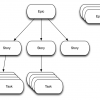 |
The Scrum Daily Standup Meeting: Your Questions Answered The daily standup, or daily scrum, is a short meeting the team uses to briefly communicate work commitments with each other. Dick Carlson answers some questions that agile teams, management, stakeholders, and those who are thinking about transitioning to agile commonly have about these daily standup meetings. |
|
 |
Test Automation in the Agile World After decades of talking about test automation, the agile movement suddenly seems to be taking it seriously. You might be wondering what all the buzz is about. Sanjay Zalavadia talks about why test tooling is suddenly so critical, when teams should think of automating, and how to bring the change so that your team will embrace it. |
|
 |
Stories, Epics, and Tasks: Organizing Agile Requirements Some teams only work with stories, but it can be difficult for a team new to agile to write stories that are easy to understand and provide value every time. An alternative is to add epics and tasks. Understanding the differences between each level and knowing what size story to use for each situation will improve the accuracy of your sprint planning. |
|
 |
Revitalize Your Retrospectives with Gamification Agile and DevOps teams, which emphasize continuous improvement, can benefit greatly from effective retrospectives. However, retrospectives can get monotonous, and that’s when they become ineffective. Using gamification in your retrospectives brings a completely different dimension of thinking—and even makes the process fun. |
|
 |
How Business Teams Can Embrace Agile Techniques As agile principles and practices receive greater organizational exposure, business teams are embracing certain aspects of agility that were traditionally reserved for technology teams. This article details the experiences of a group of people with business roles who have adopted some agile methods and how their teams have benefitted. |
|
 |
Welcome to Agile: A Developer’s Experience In this article, a developer shares his personal experience with the transition from a waterfall environment to an agile one. He compares what it was like for him coding, learning, and communicating using each methodology, and he shares what it was like making the change to agile—and why he's never looking back. |
|
 |
Know Your Customers: They Can Help You Write Better User Stories Too many user stories begin, "As a user …" Who is your user? Or, more accurately, who are they? Improving your understanding of the types of customers who use your software lets you see multiple products where previously, there was only one—and identifying dedicated products will help you prioritize and accelerate delivery. |
|
 |
Relieving Agile Tension: How to Write Small Stories That Still Have Value There are two practical goals for user stories: Each story should be beneficial to the business, and each story should represent a small piece of work. However, there is tension between these rules, and they often push in opposite directions. This article discusses how to keep stories small and tasks manageable, while ensuring they retain business value. |
|
 |
User Story Heuristics: Understanding Agile Requirements Agile emphasizes just-in-time requirements rather than upfront preparation. The requirements person—be it the product owner, business analyst, product manager, or someone else—embodies the understanding of what is needed, and the user story represents the work that needs doing. This article details what user stories are (and what they are not). |
|
 |
The Art of Maximizing Work Not Done One of the twelve principles behind the Agile Manifesto is “Simplicity—the art of maximizing the amount of work not done—is essential.” Why is this principle called an art, while the others aren’t? And why should we maximize the amount of work "not" done? This article analyzes the importance of simplicity in agile projects. |
Pages
Upcoming Events
| Apr 27 |
STAREAST Software Testing Conference in Orlando & Online |
| Jun 08 |
AI Con USA An Intelligence-Driven Future |
| Sep 21 |
STARWEST Software Testing Conference in Anaheim & Online |








